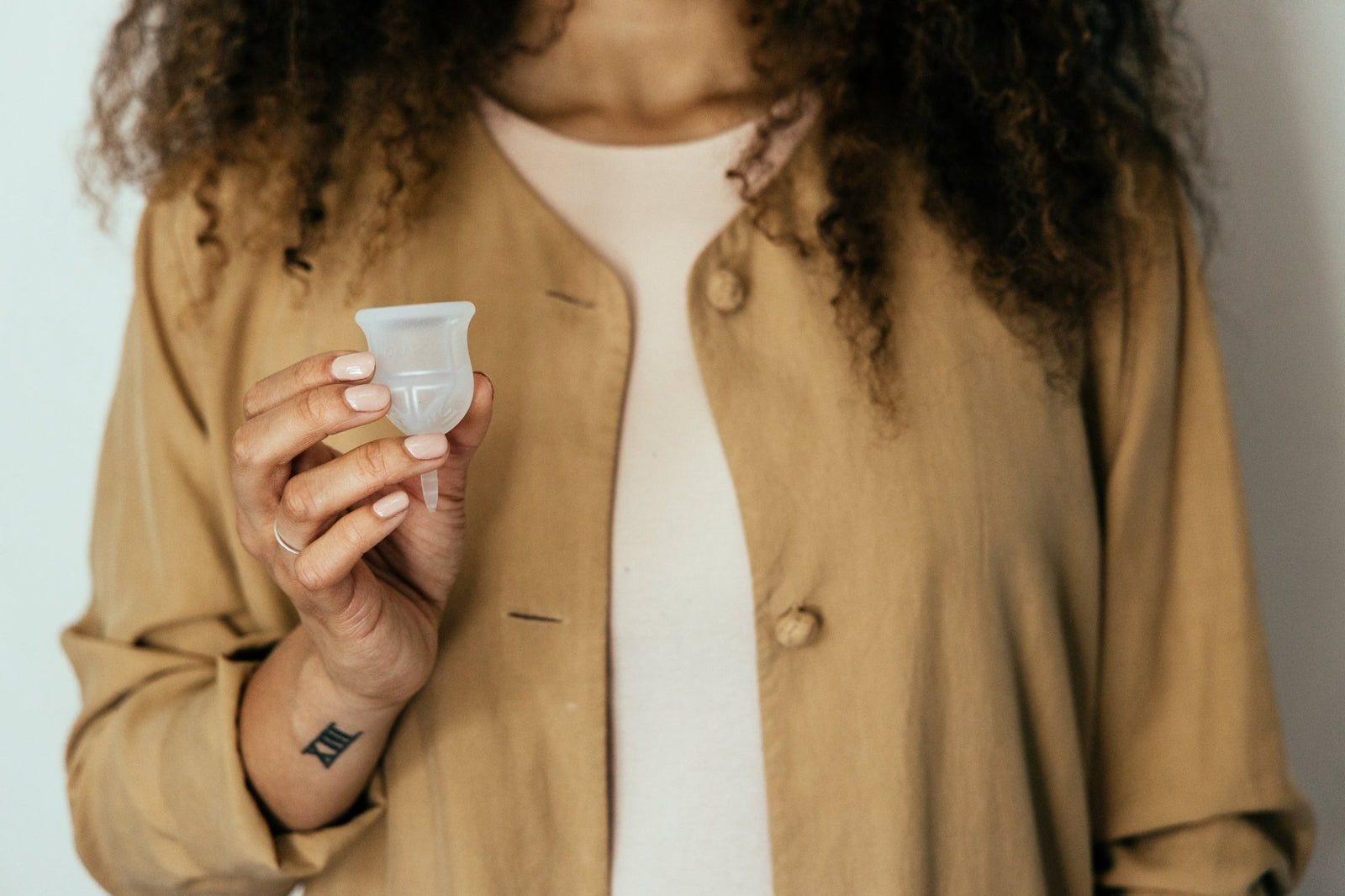Have you ever thought, “Why does my vagina smell?” You’re not alone. Everyone has experienced differentvaginal odorsat some point, including somestinky smells – it’s nothing to be embarrassed about.
Vaginal odors are natural, however, some may simply be a sign to visit your gynecologist. We will cover everything you need to know about vaginal odors - what’s normal and when to see your doctor.
What does the term vaginal odor mean?
Just as other parts of your body generate odor, so does your vagina. Any smell coming from yourvagina is avaginal odor- some smells are normal and some might be an indicator that it’s time to see your doctor. While there is a lot of misinformation about vaginal odors, rest assured, it is completely normal for your vagina to have a distinct natural smell.
Types of Vaginal Odors
There are several healthy odors your vagina can produce, as well as unpleasant or fishy smells that could possibly indicate an infection.

So, what causes these smells? What are the different types of vaginal odor? Let's find out.
Normal Vaginal Odors
Is vaginal odor normal? Yes, 100%. Yourvagina has a natural smell because it produces natural secretions that have an odor.
Some of the normal smells you may have encountered:
Tangy Smell
It'stypical for vaginas to produce a sour-like aroma. Some might compare it to the odor of fermented foods – such as yogurt, cream cheese, or sourdough bread. All of these foods contain some sort of healthy bacteria, as do ourvaginas. This shared component gives them a distinct, sour smell.
Coppery Smell
If you know what copper smells like, then you may have noticed yourvagina gives off a similar smell. This metallic scent can be a sign ofvaginal bleeding. It may linger after your period is over. Moreover, if you’ve recently had sex, then this may change the pH levelwhich causes a metallic smell.
If you experience severe vaginal bleeding or prolonged spotting after your period, you may need to consult with your doctor.
Earthy Scent
Because your vaginal area contains sweat glands, they can emit odors that give off a similar scent to the foods or drinks you have recently consumed. When you’re stressed or anxious about something, the apocrine gland will produce a milky fluid. Although this fluid is odorless, it can give off an aroma when combined with the vaginal bacteria present in your vulva.
Tip: Try using a nourishing yoni oil, like this CalmingVulva Oil to support your natural pH balance, fight odor, and moisturize any vaginal dryness. It’ssafe for sensitive skin and will allow you to feel more comfortable and confident. In case you didn’t know, the vulva is the outer skin of your genitalia – this particular product is for external use only.
Abnormal Vaginal Odors
What constitutes a“bad” vaginal odor? Look out for the following to know when to go to your gyno.
Fishy, Rotten Smell
Afishy smellcoming from your vagina may indicate the development of an infection – often bacterial vaginosis. This infection can cause an intense burning sensation, itching, or discharge which may need immediate medical attention. BV can arise after having unprotected sex, new or multiple sex partners, a change in birth control, adjusting hormones, or pH levels being thrown out of whack. Medications can effectively treat BV.
Bread-like Smell
Normally, yourvagina has a healthy ecosystem of bacteria. A yeast infection is fungal infection that causes irritation, discharge, and intense itchiness of the vulva and vagina because the good and bad bacteria in your vaginal cavity are thrown out of balance, most often by an overgrowth of Candida bacteria. It can cause cottage cheese-like, white discharge and strange odors similar to that of bread or yeast. Consult with your doctor to get it treated. A yeast infection can also develop after antibiotic use, which causes an imbalance in your natural flora. It is always a good idea to incorporate a probiotic supplement or probiotic-rich foods into your diet when taking an antibiotic to maintain and build up your natural flora that an antibiotic might disrupt.
Chemical Smell
The cleaning detergents used for cleaning floors and bathrooms have a pungent smell due to all the chemical ingredients in them. Sometimes, yourvagina may smell like that. If so, it could be a sign of an infection andtime to pay a visit to your gyno. Other symptoms to look out for:
- A thick, white, or a green discharge
- Vaginal itching
- Burning sensation
Your doctor can come up with a proper treatment plan for you.
What causes vaginal odor?
You’re not alone if you’ve ever googled, “Why do I have a strong odor down there?”. Thevagina and your vulva contain healthy bacteria and sweat glands that cause natural odor, like any other body part. Your vagina is self-cleaning and creates healthy discharge – to maintain lubrication and support your menstrual cycle – which comes with an expected normal body odor. Abnormal orfishy smells are often caused by an infection and are a sign you need to talk to your gyno.
Though it may be tempting to get your hands on a vaginal deodorant to minimize abnormal odors, they often make the situation worse. They might increase skin irritation, throw off your natural pH balance, or exacerbate an already unpleasant infection! So, while it might be tempting to mask symptoms, it is always better to see your doctor, work to get your pH back in balance, and stick to natural, non-toxic, and fragrance-free soaps and moisturizers or just use water.
What causes the scent of yourvagina to vary?
Vaginal odors can vary or change depending on where you are with your menstrual cycle, physical activity and sweating, or even sex can cause vaginal odor. Other factors include:
- hydration levels
- last meal you ate
- medicine you take
- overall health status
Some unhealthy factors that can lead to having anabnormal smell may include:
- poor hygiene
- vaginal infection
- leaving a tampon in too long
- douching
- poor diet
- hormonal changes experienced during pregnancy, menstruation, menopause, or change in birth control
- use of antibiotics without replenishing natural flora with probiotics
What causes vaginal odor during pregnancy?
Your body goes through some pretty wild changes during pregnancy, and it’s no surprise it can change the smell of your vagina. The majority will experiencevaginal odor during pregnancy, and it can even be an indicator you’re expecting in the first place.

Every body is different, and every pregnancy is unique as well. Some may not encounter any changes in odor at all. If you do, some of the culprits may be:
- your hormones - a pregnancy means intense hormonal changes that can trigger physical changes, such as more secretions from yourvagina
- what you eat - all those cravings can cause changes in your vaginal odor
- dehydration - you need to hydrate more while pregnant
What is your pH balance and why is it important?
The pH level indicates how basic or acidic the compounds in your blood are that allow your body to optimally function. When it comes to your vaginal health, your pH balance is of the utmost importance.A healthy vagina is slightly acidic as a result of the good bacteria which keeps the bad bacteria in check, helping avoid abnormal odors and infections, likebacterial vaginosis or yeast infections.
When your pH balance is off, you are vulnerable to infections. Bad bacteria can flourish and overrun your vagina. Factors that can affect your pH balance:
- scented body washes or intimate washes near your vulva
- douching
- scented period care
- intercourse
- semen
- using oil-based lubricants during sex
- stress
- taking antibiotics (Surprised? While they get rid of the bad bacteria, they often get rid of the good bacteria, too.)
- your period
Tips for maintaining a healthy vaginal pH balance
- consider using a condom anytime you have sex – unprotected sex exposes you to the pH levels of your partner, which can affect yours
- try eating yogurt low in sugar and high in probiotics - the same healthy bacteria found in your vagina are also in yogurt (never put yogurt in your vagina, no matter what influencer tells you to)
- see your OB-GYN regularly – going for checkups can help in maintaining your vaginal health
- find fun, healthy ways to destress – yes, stress can not only impact your skin (acne, anyone?), it can also impact your vagina
- wash your underwear with a hypoallergenic, fragrance-free detergent to avoid exposure to chemicals during wear
- Stay away from synthetic fabrics and use something more breathable like Q for Quinn’s cotton underwear for ladies or VOXAPOD’s high-quality, reusable period underwear
- change your panties regularly (even if you don’t shower) if you have a lot of moisture buildup, discharge, or irritation
- if you use tampons, change them regularly – or switch to a menstrual cup, such as VOXAPOD menstrual cup, which is non-toxic, made of medical-grade silicone, and can be worn for up to 12 hours at a time
- stay hydrated – drinking plenty of water helps flush out toxins and aids in regulating the vaginal environment
Should I use douching or yoni steams to clean my vagina?
Remember yourvagina is self-cleaning! Using aggressive techniques, such as douching or yoni steams, strips thevagina of your good bacteria, leading to… you guessed it, odor!
You should avoid anything marketed as “internal washes” because the truth is, you don’t need it and it will likely disrupt your natural pH balance. It can also become quite dangerous; if you already have an infection, such as bacterial vaginosis or yeast, douching can push the bacteria further up, which can lead to more serious health problems.
Yoni steamsalso disrupt your healthy bacteria environment. Moreover, you can accidentally burn yourvagina, which has really delicate and thin skin. Caring for your genital area should always be gentle.
TLDR: no, douching or yoni steams are not safe or recommended.
What is safe to use on my vagina?
- keep it simple in the shower: your hands suffice (no facecloths)
- mild, non-toxic, fragrance-free cleansers with warm water
- washing only the external part of your vagina, known as the vulva
- unscented, non-toxic period care such as a reusable menstrual cup or leakproof period underwear
- natural yoni or vulva oil that is non-toxic, hypoallergenic, and fragrance-free
Healthy tips to reduce vaginal odor
A certain level ofvaginal odor is normal and healthy, but you can reduce the chance of abnormal odors by implementing some of these simple practices:
- don’t wait too long to shower after hitting the gym or exercising
- wear breathable, cotton panties: tight undergarments (i.e.lycra and spandex) are not very breathable
- prioritize staying hydrated
- try going commando at night to let your vag breathe
- use condoms and make sure to pee after sex
- reduce the time wearing tight clothes, such as lycra, jeans, and yoga pants
- avoid the use of scented products in and around the vaginal area
- wash gently with warm water and do not use antibacterial or scented soaps
- switch to a menstrual cup made with medical-grade silicone
- change disposables, like pads and tampons, often to prevent the growth of bad bacteria, unwanted odor, and risk of infection
- avoid wearing wet or damp underwear for too long
- make sure to shower off after swimming in a lake, river, or chlorinated pool
- avoid wearing panty liners or pads unless absolutely necessary, as these don’t let your vagina breathe as well
Vaginal odor “treatments” to avoid
There have been many celebrities and influencers who have dangerously promoted unhealthyvaginal treatments (*cough* Chrissy Teigen *cough*) that can be detrimental. Many influencers and online articles may also promote them, but that certainly does not make them healthy or medically advised.
Some harmful practices that can disrupt your vaginal health include:
- douches
- yoni steams
- scented period care products
- overwashing or scrubbing your vagina (on the inside)
- using antibacterial or scented soaps
- scented deodorant sprays for your vagina
- inserting any type of food down there (garlic cloves, yogurt, etc.)
How long does it take for abnormal odors to go away?
It depends on whether you’re dealing with an infection, bad hygiene, or something else. Normally, after identifying the cause and treating it, the unwanted odors should be resolved within a few days unless more routine treatment or care is required.
Wrapping Up
Your vaginal scent may experience a lot of shifts over the years for different biological reasons. This is innate and human, and there’s no need to feel ashamed. Society has established hurtful and untrue stereotypes aboutvaginas – it’s not uncommon to struggle in your relationship with your own vagina for this reason. Know that any time yourvaginal odors change, it is most commonly a result of pH levels being imbalanced and has nothing to do with your worth.
Remember a change in vaginal odor can change with simple things, like the foods you consume, diet you follow, the amount of emotional stress you carry, or simply having sex with your partner. If your partner is male, semen has a relatively high pH which can clash with your vagina. But, there is no need to worry – this change is only temporary. Also, as you age, menopause can also be a possible culprit. Due to a lack of estrogen level,those undergoing menopause end up with less vaginal mucosa, reducing pH level maintenance.
As you can see, there are many reasons why yourvagina may produce different odors and now you can more easily identify what is normal and when to see your doctor. Keep in mind, infections are common and are often easily resolved with effective medications or lifestyle changes. You got this!





Spell/herbal solution
January 09, 2026
looking for a spell or herbal remedy for any diseases?
Pregnancy Spell to Conceive a Baby,
Goodluck spell,
Lotto spell,
spell to restore your marriage,
If you want to stop your divorce.
cure for herpes,
cure for diseases like (HIV), (CANCER) or any illness.
e.t.c
Contact us directly on Email: osazu_spell@outlook.com
telegram -— https://t.me/solution59